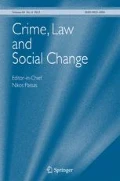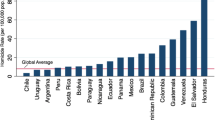Abstract
The underlying legitimacy issue that underpin sentences related to issues of drug use remains unexplored. It is this relationship between legitimacy and Indonesian judges' accountability when sentencing that this article explores. Judicial activism, and the perceived public legitimacy when sentencing minor drug offenders is presented. To gain an insight into the judicial aim of sentencing minor drug offenders, 31 judges were qualitatively interviewed. Drawing together the findings of judicial activism and public legitimacy, the report concludes that judicial activism is influenced by Islamic culture. Moreover, it finds that Islamic culture is more sympathetic, in comparison with the central government, which is more punitive, with regards to the ways in which the Indonesian judge utilises Islamic culture to support the rehabilitative problem-solving sentences. This report discusses a direct accountability mechanism that is not dissimilar to political accountability in the Anglo-Saxon legal scheme.
Similar content being viewed by others
Notes
The Media.com is an online newspaper. People can subscribe to receive this timely and updated news.
Adversary here relate to how the offender is placed opposite to the prosecutor in the courtroom, and so they seem to battle each other.
The following Koranic verses are showing these three forms of justice. "To the believer, be steadfast as God's services and pursuit of justice.
References
Anleu, S. R., Brewer, R., & Mack, K. (2017). Locating the judge within sentencing research. International Journal for Crime, Justice and Social Democracy, 6(2), 46.
Biland, É., & Steinmetz, H. (2017). Are the judge’s street-level bureaucrats? Evidence from French and Canadian family courts. Law & Social Inquiry, 42(2), 298–324. https://doi.org/10.1111/lsi.12251.
Davis, N. J., & Robinson, R. V. (2006). The egalitarian face of Islamic orthodoxy: Support for Islamic law and economic justice in seven Muslim-majority nations. American Sociological Review, 71(2), 167–190. https://doi.org/10.1177/000312240607100201.
Goffman, E. (1959). The presentation of self in everyday life. Anchor.
Hart, H. L. A., & Green, L. (2012). The concept of law. Oxford University Press. https://doi.org/10.1093/he/9780199644704.001.0001.
Helm, R. K. (2019). Constrained waiver of trial rights? Incentives to plead guilty and the right to a fair trial. Journal of Law and Society, 46(3), 423–447. https://doi.org/10.1111/jols.12169.
Hutton, N. (2016). ViSentencing as a social practice. In: S. Armstrong and L. McAra eds. Perspectives on punishment: the contours of control, Oxford: Oxford University Press, 155–174. https://doi.org/10.1007/978-3-319-25802-7_10
Klein, D. E., & Mitchell, G. (2016). The psychology of judicial decision making. Oxford University Press. https://doi.org/10.1093/acprof:oso/9780195367584.001.0001
Kramer, J. H., & Ulmer, J. T. (2009). Sentencing guidelines: Lessons from Pennsylvania. Lynne Reiner Publishers.
Lipsky, M. (2010). Street-level bureaucracy: Dilemmas of the individual in public service. 30th. (Anniversary). Russell Sage Foundation.
Mustafa, C. (2018). " Punishment did not resolve the problem": The judicial perspectives on the sentencing of minor drug offenders in Indonesia. In Papers from the British Criminology Conference (Vol. 16, pp. 93–110). British Society of Criminology
Mustafa, C., Malloch, M., & Hamilton Smith, N. (2020). Judicial perspectives on the sentencing of minor drug offenders in Indonesia: discretionary practice and compassionate approaches. Crime, Law and Social Change, 74, 297–313. https://doi.org/10.1007/s10611-020-09896-0
Mustafa, C. (2020). The perceptions of Indonesian judges in sentencing minor drug offenders: Challenges and opportunities. JurnalHukumdanPeradilan [Journal of Law and Court Justice], 9(1), 1–26. https://doi.org/10.25216/JHP.9.1.2020.1-26.
Mustafa, C., Malloch, M., & Smith, N. H. (2020). Judicial perspectives on the sentencing of minor drug offenders in Indonesia: Discretionary practice and compassionate approaches. Crime, Law and Social Change. https://doi.org/10.1007/s10611-020-09896-0.
Nolan, J. L. (2003). Reinventing justice: The American drug court movement. Princeton University Press.
Padfield, N. (2016). 13 Reflections on sentencing in England and Wales. The Psychology of Crime, Policing and Courts, 231
Painter-Davis, N., & Ulmer, J. T. (2020). Discretion and disparity under sentencing guidelines revisited: The interrelationship between structured sentencing alternatives and guideline decision-making. Journal of Research in Crime and Delinquency, 57(3), 263–293. https://doi.org/10.1177/0022427819874862.
Roberts, J. V., & Ashworth, A. (2016). The evolution of sentencing policy and practice in England and Wales, 2003-2015. Crime and Justice, 45(1), 307–358. https://doi.org/10.1086/685754
Ulmer, J. T., & Johnson, B. D. (2017). Organizational conformity and punishment. The Journal of Criminal Law and Criminology 1973, 107(2), 253–292.
Author information
Authors and Affiliations
Corresponding author
Additional information
Publisher's Note
Springer Nature remains neutral with regard to jurisdictional claims in published maps and institutional affiliations.
Rights and permissions
About this article
Cite this article
Mustafa, C. The view of judicial activism and public legitimacy. Crime Law Soc Change 76, 23–34 (2021). https://doi.org/10.1007/s10611-021-09955-0
Accepted:
Published:
Issue Date:
DOI: https://doi.org/10.1007/s10611-021-09955-0




